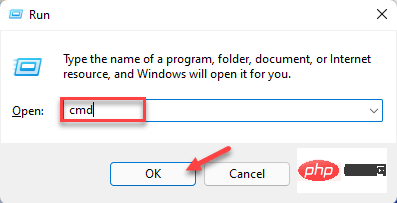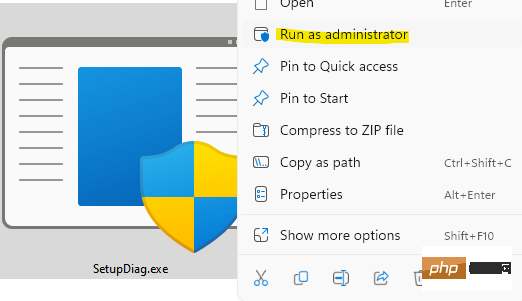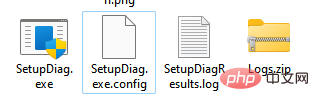How to identify Windows upgrade issues using SetupDiag on Windows 11/10
Whenever your Windows 11 or Windows 10 PC has an upgrade or update issue, you will usually see an error code indicating the actual cause behind the failure. However, sometimes confusion can arise when an upgrade or update fails without an error code being displayed. With handy error codes, you know exactly where the problem is so you can try to fix it. But since no error code appears, it becomes challenging to identify the issue and resolve it. This will take up a lot of your time to simply find out the reason behind the error.
In this case, you can try using a dedicated tool called SetupDiag provided by Microsoft, which can help you easily identify the real cause behind the error and save time in finding a fix for the problem. This utility is free to use and is designed to determine the root cause behind a failed upgrade or update.
This utility checks the cached Windows Installer logs generated by the installation process, which are now forgotten. At the same time, it also scans the database for common errors to find any details that indicate the real cause of the installation failure. This will ultimately help you find the appropriate fix for the error. Additionally, the SetupDiag tool is known to contain a large database of rules (approximately 60) containing issues identified by Microsoft. However, the rules are updated every time the tool gets a new version.
This article will guide you through the process on how to use SetupDiag to identify Windows upgrade issues on Windows 11/10.
How to use SetupDiag to determine why an upgrade failed
Although using the SetupDiag tool is very simple, before proceeding, make sure your system meets the .NET Framework requirements. You can then run the utility smoothly and generate results. Let’s see how to check if your PC has the required .NET Framework version:
How to check if your PC is compliant with .NET Framework
Step 1: Press the Win R keys simultaneously on your keyboard to launch the Run Command window.
Step 2: In the Run Command search field, type cmd in the search bar and press on your keyboard Ctrl Shift Enter shortcut key opens an elevated Command Prompt window.

Step 3: In the Command Prompt( admin) window, run the following command and press Enter:
reg query "HKLM\SOFTWARE\Microsoft\Net Framework Setup\NDP\v4" /s
Step 4: Now, in the results, check the Version field and make sure the version is 4.6 or higher version, you can use the SetupDiag tool at this time.
*Note –If your device does not come with .NET 4.6 or higher, please visit the Microsoft official download page to get the .NET 4.6 installer and download it manually and Installation files.
Now, continue running the SetupDiag tool.
How to run the SetupDiag tool
Follow the following instructions to run the utility:
Step 1:Click the link below to visit the official Microsoft SetupDiagTool download page:
Download SetupDiag tool
Step 2:Now, from the home page, click Download SetupDiag button.
Step 3: After downloading the .exe file, right-click on it and select Show in folder.
It will usually take you to the Downloads folder.
Now, cut and paste this file into an empty folder.
*NOTE – If necessary, create a new folder and paste it into this folder.
Step 4: Now, press the Win E keys simultaneously on your keyboard to open the File Explorer window.
Step 5: In the File Explorer window, navigate to the location where the SetupDiag.exe file is saved.
Next, right-click the .exe file and select Run as administrator.

Now the tool will start running immediately and the best part is, it does not require installation or any interaction. It runs a scan to check the logs generated by failed installations for any available rules. Once completed, the tool will automatically close.
After the scanning process is completed, it will generate three new files - Log.zip, SetupDiag.exe.config and SetupDiagResults.log and save them in the folder where the SetupDiag.exe file is located.

How to read SetupDiag results
Here's how to read SetupDiag results and understand them:
Step 1: Go to Start , right-click it and select File Explorer.
Step 2: In the File Explorer window, navigate to the folder where SetupDiag,exe is saved.
Here, look for SetupDiagResults.log, right-click on it and click Open.
Step 3: This will open the log file where you can view the results extracted by the tool after scanning for available rules.
For example, if you try to upgrade to the latest version of Windows 10 and then the device is force shut down, the installation process will direct the operating system to the older version of Windows 10 and store an error log on the device.
So when you open the log file you will see the system details like PC name, manufacturer name, BIOS (UEFI) version, original version of Windows 10, etc. in the upper part and then you will see Go to the error details at the bottom with the error code.
It also mentions the exact cause or root cause of the problem and the solution to resolve it. If there are no steps or solutions, click on the link provided or look for the error code or any other relevant information to find any available solutions online. Alternatively, you can use the resources available in the Microsoft Forums to find solutions.
The above is the detailed content of How to identify Windows upgrade issues using SetupDiag on Windows 11/10. For more information, please follow other related articles on the PHP Chinese website!

Hot AI Tools

Undresser.AI Undress
AI-powered app for creating realistic nude photos

AI Clothes Remover
Online AI tool for removing clothes from photos.

Undress AI Tool
Undress images for free

Clothoff.io
AI clothes remover

Video Face Swap
Swap faces in any video effortlessly with our completely free AI face swap tool!

Hot Article

Hot Tools

Notepad++7.3.1
Easy-to-use and free code editor

SublimeText3 Chinese version
Chinese version, very easy to use

Zend Studio 13.0.1
Powerful PHP integrated development environment

Dreamweaver CS6
Visual web development tools

SublimeText3 Mac version
God-level code editing software (SublimeText3)

Hot Topics
 Can I install mysql on Windows 7
Apr 08, 2025 pm 03:21 PM
Can I install mysql on Windows 7
Apr 08, 2025 pm 03:21 PM
Yes, MySQL can be installed on Windows 7, and although Microsoft has stopped supporting Windows 7, MySQL is still compatible with it. However, the following points should be noted during the installation process: Download the MySQL installer for Windows. Select the appropriate version of MySQL (community or enterprise). Select the appropriate installation directory and character set during the installation process. Set the root user password and keep it properly. Connect to the database for testing. Note the compatibility and security issues on Windows 7, and it is recommended to upgrade to a supported operating system.
 How to solve mysql cannot connect to local host
Apr 08, 2025 pm 02:24 PM
How to solve mysql cannot connect to local host
Apr 08, 2025 pm 02:24 PM
The MySQL connection may be due to the following reasons: MySQL service is not started, the firewall intercepts the connection, the port number is incorrect, the user name or password is incorrect, the listening address in my.cnf is improperly configured, etc. The troubleshooting steps include: 1. Check whether the MySQL service is running; 2. Adjust the firewall settings to allow MySQL to listen to port 3306; 3. Confirm that the port number is consistent with the actual port number; 4. Check whether the user name and password are correct; 5. Make sure the bind-address settings in my.cnf are correct.
 Solutions to the errors reported by MySQL on a specific system version
Apr 08, 2025 am 11:54 AM
Solutions to the errors reported by MySQL on a specific system version
Apr 08, 2025 am 11:54 AM
The solution to MySQL installation error is: 1. Carefully check the system environment to ensure that the MySQL dependency library requirements are met. Different operating systems and version requirements are different; 2. Carefully read the error message and take corresponding measures according to prompts (such as missing library files or insufficient permissions), such as installing dependencies or using sudo commands; 3. If necessary, try to install the source code and carefully check the compilation log, but this requires a certain amount of Linux knowledge and experience. The key to ultimately solving the problem is to carefully check the system environment and error information, and refer to the official documents.
 MySQL can't be installed after downloading
Apr 08, 2025 am 11:24 AM
MySQL can't be installed after downloading
Apr 08, 2025 am 11:24 AM
The main reasons for MySQL installation failure are: 1. Permission issues, you need to run as an administrator or use the sudo command; 2. Dependencies are missing, and you need to install relevant development packages; 3. Port conflicts, you need to close the program that occupies port 3306 or modify the configuration file; 4. The installation package is corrupt, you need to download and verify the integrity; 5. The environment variable is incorrectly configured, and the environment variables must be correctly configured according to the operating system. Solve these problems and carefully check each step to successfully install MySQL.
 Unable to access mysql from terminal
Apr 08, 2025 pm 04:57 PM
Unable to access mysql from terminal
Apr 08, 2025 pm 04:57 PM
Unable to access MySQL from the terminal may be due to: MySQL service not running; connection command error; insufficient permissions; firewall blocks connection; MySQL configuration file error.
 How to copy and paste mysql
Apr 08, 2025 pm 07:18 PM
How to copy and paste mysql
Apr 08, 2025 pm 07:18 PM
Copy and paste in MySQL includes the following steps: select the data, copy with Ctrl C (Windows) or Cmd C (Mac); right-click at the target location, select Paste or use Ctrl V (Windows) or Cmd V (Mac); the copied data is inserted into the target location, or replace existing data (depending on whether the data already exists at the target location).
 How to pull the vertical reference line of PS
Apr 06, 2025 pm 08:18 PM
How to pull the vertical reference line of PS
Apr 06, 2025 pm 08:18 PM
Pull vertical guides in Photoshop: Enable ruler view (View > ruler). Hover the mouse over the vertical edge of the ruler, and then the cursor becomes a vertical line with double arrows and hold and drag the mouse to pull out the reference line. Click Delete by dragging the guide, or hovering it into a cross.
 MySQL download prompts disk write errors how to deal with
Apr 08, 2025 am 11:51 AM
MySQL download prompts disk write errors how to deal with
Apr 08, 2025 am 11:51 AM
MySQL download prompts a disk write error. The solution is as follows: 1. Check whether the disk space is insufficient, clean up the space or replace a larger disk; 2. Use disk detection tools (such as chkdsk or fsck) to check and fix disk errors, and replace the hard disk if necessary; 3. Check the target directory permissions to ensure that the user account has write permissions; 4. Change the download tool or network environment, and use the download manager to restore interrupted download; 5. Temporarily close the anti-virus software or firewall, and re-enable it after the download is completed. By systematically troubleshooting these aspects, the problem can be solved.





